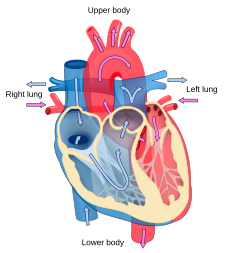 Blood flow diagram of the human heart. Blue components indicate de-oxygenated blood pathways and red components indicate oxygenated blood pathways. | |
| System | Cardiovascular |
|---|---|
| Subdivisions |
|
| Significant diseases | |
| Significant tests | Blood tests, electrophysiology study, cardiac imaging, ECG, echocardiograms, stress test |
| Specialist | Cardiologist |
| Glossary | Glossary of medicine |
| Occupation | |
|---|---|
| Names |
|
Occupation type | Specialty |
Activity sectors | Medicine, Surgery |
| Description | |
Education required |
|
Fields of employment | Hospitals, Clinics |
Cardiology (from Ancient Greek καρδίᾱ (kardiā) 'heart' and -λογία (-logia) 'study') is the study of the heart. Cardiology is a branch of medicine that deals with disorders of the heart and the cardiovascular system. The field includes medical diagnosis and treatment of congenital heart defects, coronary artery disease, heart failure, valvular heart disease, and electrophysiology. Physicians who specialize in this field of medicine are called cardiologists, a sub-specialty of internal medicine. Pediatric cardiologists are pediatricians who specialize in cardiology. Physicians who specialize in cardiac surgery are called cardiothoracic surgeons or cardiac surgeons, a specialty of general surgery.[1]
- ^ Herper, Matthew (December 5, 2017). "27 Top Cardiologists, Picked By Big Data". Forbes. Retrieved June 2, 2022.